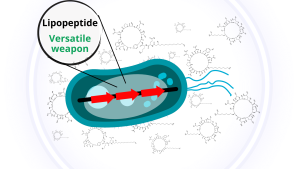Prelecionista: Ms. Amarildo L. da Silva Júnior. Data: 25/05/2021, às 16:00 horas pelo ZOOM*. Orientador: Lucas M. Abreu
Cyclic lipopeptides constitute a structurally diverse group of secondary metabolites commonly produced by different rhizobacteria with promising application potential in different areas, such as industry, medicine, and agriculture. While chemically diverse, they have a basic structure formed by one oligopeptide and a fatty acid moiety, giving the molecules an amphiphilic nature (hydrophilic and hydrophobic regions), and the capacity to interact with biological membranes, resulting in membrane disturbance and pore formation. These molecules are biosynthetically produced by multi enzymatic complexes called peptide synthetases that catalyze the biosynthesis through modules that incorporate amino acids into the peptide chain; the fatty acid chain comes from the primary metabolism. In the context of plant pathology, these molecules play multiple roles, such as biofilm formation, contribution to virulence in pathogenic Pseudomonas, and stimulation of plant defense mechanisms, in addition to the known antagonistic activities of LLPs towards a wide range of potential phytopathogens, including bacteria, fungi, and oomycetes. In view of all of this versatility, the interest in the use of LPPs produced by Bacillus for the biological control of plant disease has increased, with research efforts directed towards the optimization of cultivation techniques and the composing of biological products enriched in bacterial cells and bioactive metabolites. In this seminar, the intrinsic characteristics of cyclic lipopeptides and their versatility in plant pathology will be addressed based on Bacillus and pathogenic Pseudomonas, with further explorations of some aspects involved in the biological control by LPP producing strains.
*Interessados contatar pos.fitopatologia@ufv.br para solicitar o link do Zoom.

